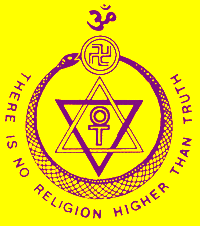A FREE INTRO TO THEOSOPHY

An Outline
of Theosophy
By
Charles
Webster Leadbeater

The Wider
Outlook
A little thought will soon show us what a radical change is introduced
into the life of the man who realises that his physical life is nothing but a
day at school, and that his physical body is merely a temporary vesture assumed
for the purpose of learning through it. He sees at once that this purpose of
“learning the lesson” is the only one of any importance, and that the man who
allows himself to be diverted from that purpose by any consideration is acting
with inconceivable stupidity.
To him who knows the truth, the life of the ordinary person devoted
exclusively to physical objects, to the pursuit of wealth and fame, appears the
merest child’s play – a senseless sacrifice of all that is really worth having
for a few moments gratification of the lower parts of man’s nature.
The student “sets his affection on things above, and not on things of
the earth”, not only because he sees this to be a right course of action, but
because he realises very clearly the valuelessness of these things of earth.
He always tries to take the higher point of view, for he sees that the
lower is utterly unreliable – that the lower desires and feelings gather round
him like a dense fog, and make it impossible for him to see anything clearly
from that level.
Yet even when he is thoroughly convinced that the higher course is
always the right one, and when he is fully determined to follow it, he will
nevertheless sometimes encounter very strong temptations to take the lower
course, and will be sensible of a great struggle within him. He will discover
that there is “a law of the members warring against the law of the mind”, as
St. Paul says, so that “those things that I would, I do not, and the thing
which I would not, that I do”.
Now good religious people often make the most serious mistakes about
this interior struggle which we have all felt to a greater or less extent. They
usually accept one or two theories on the subject.
Either they suppose that the lower promptings come from exterior
tempting demons, or else they mourn over the terrible wickedness and blackness
of their hearts, in that such fathomless evil still exists within them. Indeed,
many of the best men and women go through a vast amount of totally unnecessary
suffering on this account.
The first point to have clearly in mind if one wishes to understand this
matter is that the lower desire is not in truth our desire at all. Nor is it the work of some demon trying to
destroy our souls. It is true that there sometimes are evil entities which are
attracted by the base thought in man, and intensify it by their action; but
such entities are man-made, everyone of them, and impermanent.
They are merely artificial forms called into existence by the thought of
other evil men, and they have a period of what seems almost like life,
proportioned to the strength of the thought that created them.But the
undesirable prompting within us usually comes from quite another source.
It has been mentioned how man draws round him vestures of matter at
different levels, in order that he may descend into incarnation. But this
matter is not dead matter (indeed, occult science teaches us that there is no
such thing as dead matter anywhere), but it is instinct with life; though it is
life at a stage of evolution much earlier than our own – so much earlier that
it is still moving on a downward course into lower matter, instead of rising
again out of lower matter into higher.
Consequently its tendency is always to press downwards towards the
grosser material and the coarser vibrations which mean progress for it, but
retrogression for us; and so it happens that the interest of the true man
sometimes comes into collision with that of the living matter in some of his
vehicles.
That is a very rough outline of the explanation of the curious internal
strife that we sometimes feel – a strife which has suggested to the poetic
minds the idea of good and evil angels in conflict over the soul of man. A more
detailed account will be found in The Astral Plane, p. 40.
But in the meantime it is important that the man should realise that he
is the higher force, always moving towards and battling for good, while this
lower force is not he at all, but only an uncontrolled fragment of one of his
lower vehicles.
He must learn to control it, to dominate it absolutely, and to keep it
in order; but he should not therefore, think of it as evil, but as an
outpouring of the Divine power moving on its orderly course, though that course
in this instance happens to be downwards into matter, instead of upwards and away
from it, as ours is.
For more info on Theosophy
Try these

Cardiff
Theosophical Society meetings are informal
and there’s always
a cup of tea afterwards
The Cardiff Theosophical Society Website
The National Wales Theosophy Website
Theosophy
Wales Youtube Channel
Ten Benefits of Studying the Blavatskyan
Theosophical Teachings
Studying
the Blavatskyan Theosophical teachings offers numerous benefits that can
greatly enrich one's understanding of spirituality, philosophy, and the nature
of reality. Theosophy, as defined by the
writings of Helena Petrovna Blavatsky, has had a profound impact on the
spiritual and philosophical landscape of the modern world. Blavatsky's teachings
draw from a wide range of religious and philosophical traditions, including
Hinduism, Buddhism, and Western esotericism, and present a comprehensive
worldview that addresses fundamental questions about existence, consciousness,
and the cosmos.
Here
are ten benefits of studying the Blavatskyan Theosophical Teachings
1.
Exploration of Esoteric Wisdom
One
of the primary benefits of studying the Blavatskyan Theosophical teachings is
the opportunity to explore esoteric wisdom that is often not readily accessible
in mainstream religious or philosophical traditions. Blavatsky's writings delve
into the esoteric teachings of ancient cultures and mystery schools, shedding
light on profound spiritual truths that have been passed down through the ages.
By delving into these esoteric teachings, students of Theosophy can gain
insights into the nature of consciousness, the structure of the cosmos, and the
evolution of the soul or immortal self.
2.
Synthesis of Eastern and Western Philosophy
Blavatsky's
Theosophical teachings synthesize elements of Eastern and Western philosophy,
offering a comprehensive framework that integrates concepts from diverse
cultural and religious traditions. This synthesis provides students with a
broader perspective on philosophical and spiritual thought, allowing them to
see the underlying unity of seemingly disparate belief systems. By studying
Theosophy, individuals can gain a deeper appreciation for the universal
principles that underlie all wisdom traditions, fostering a sense of unity and
interconnectedness with the world's spiritual heritage.
3.
Understanding of Universal Brotherhood
Central
to Blavatsky's Theosophical teachings is the principle of universal
brotherhood, which emphasizes the essential unity of all beings and the
interconnectedness of life. By studying Theosophy, individuals can develop a
profound understanding of the interconnected nature of existence, recognizing
that all living beings are fundamentally linked and that compassion and empathy
are essential for the evolution of humanity. This understanding can lead to a
greater sense of empathy, kindness, and social responsibility, fostering a more
harmonious and compassionate society.
4.
Insight into the Nature of Reality
The
Blavatskyan Theosophical teachings offer profound insights into the nature of
reality, consciousness, and the unseen dimensions of existence. Through the
study of Theosophy, individuals can explore concepts such as the
multi-dimensional nature of the universe, the existence of subtle energy realms,
and the interconnectedness of the material and spiritual planes. This
exploration can lead to a deeper understanding of the nature of reality beyond
the limitations of the physical senses, opening up new vistas of perception and
understanding.
5. Personal
Spiritual Growth
Studying
the Theosophical teachings can be a transformative journey that facilitates
personal spiritual growth and self-discovery. Blavatsky's writings offer
practical guidance for inner development, including meditation practices,
ethical principles, and the cultivation of spiritual virtues. By applying these
teachings to their lives, individuals can experience profound personal
transformation, leading to greater self-awareness, inner peace, and a sense of
purpose and meaning.
6. Ethical
and Moral Guidance
The
Theosophical teachings provide a comprehensive ethical and moral framework that
can guide individuals in their personal and social interactions. Blavatsky
emphasizes the importance of ethical conduct, altruism, and the pursuit of
wisdom, offering practical guidance for leading a virtuous and meaningful life.
By studying Theosophy, individuals can gain clarity on moral issues, cultivate
a sense of ethical responsibility, and contribute to the greater good of
humanity.
7.
Appreciation of Comparative Religion
The
study of Theosophy encourages an appreciation of comparative religion and the
underlying unity of religious and spiritual traditions. Blavatsky's writings
explore the common threads that run through the world's religions, highlighting
universal spiritual principles that transcend cultural and historical
boundaries. By gaining a deeper understanding of comparative religion through
Theosophy, individuals can develop a more inclusive and pluralistic
perspective, fostering interfaith harmony and mutual respect.
8.
Intellectual Stimulation
The
Theosophical teachings offer a rich and intellectually stimulating framework
for exploring profound philosophical and metaphysical concepts. Blavatsky's
writings encompass a wide range of subjects, including cosmology, metaphysics,
ancient wisdom, and the evolution of consciousness, providing ample material
for intellectual inquiry and contemplation. By engaging with these teachings,
individuals can expand their intellectual horizons, develop critical thinking
skills, and gain a deeper understanding of the fundamental questions that have
intrigued philosophers and mystics throughout history.
9.
Healing and Reconciliation
The
Theosophical teachings offer insights into the nature of healing and
reconciliation, both on a personal and collective level. Blavatsky's writings
delve into the esoteric principles of healing, the nature of disease, and the
interconnectedness of mind, body, and spirit. By studying Theosophy,
individuals can gain a deeper understanding of holistic healing modalities, the
power of the mind in influencing health, and the potential for spiritual
transformation through the healing process. Furthermore, the Theosophical
emphasis on universal brotherhood and compassion can contribute to the
reconciliation of divisions and conflicts within society, fostering a more
harmonious and peaceful world.
10.
Contribution to Global Transformation
Finally,
studying the Blavatskyan Theosophical teachings can empower individuals to
contribute to the ongoing global transformation towards a more enlightened and
compassionate world. Blavatsky's vision of a spiritually awakened humanity,
working towards the betterment of all beings, inspires individuals to engage in
positive action and service to humanity. By embodying the principles of
Theosophy in their lives, individuals can become agents of positive change,
working towards the realization of a more just, peaceful, and sustainable
world.
In
summary, the study of the Blavatskyan Theosophical teachings offers a wide
range of benefits, ranging from personal spiritual growth to the potential for
global transformation. By delving into the esoteric wisdom, ethical principles,
and philosophical insights of Theosophy, individuals can expand their understanding
of the nature of reality, cultivate compassion and empathy, and contribute to
the evolution of humanity towards a more harmonious and enlightened future. As
the Theosophical teachings continue to inspire and guide seekers of truth and
wisdom, their profound impact on individuals and society is likely to endure
for generations to come.
Dave’s Streetwise Theosophy Boards
This is for everybody not just people in Wales
Theosophy Cardiff’s Instant Guide to Theosophy
General pages about Wales, Welsh History
and The History of Theosophy in Wales
Teosofia en Cardiff (Página en Español)
One Liners & Quick Explanations
The Most Basic Theosophy Website in the Universe
If you run a Theosophy Study Group you can use
this as an introductory handout
The
South of Heaven Guide to
Theosophy and Devachan
The preparation of this Website
The Spiritual Home of Urban Theosophy
The Earth Base for Evolutionary Theosophy
Classic Introductory Theosophy Text
A Text Book of Theosophy By C
What Theosophy Is From the Absolute to Man
The Formation of a Solar System The Evolution of Life
The Constitution of Man After Death Reincarnation
The Purpose of Life The Planetary Chains
The Result of Theosophical Study
An Outstanding
Introduction to Theosophy
By a student of
Katherine Tingley
Elementary Theosophy Who is the Man? Body and Soul
Body, Soul and Spirit Reincarnation Karma
Preface to the American Edition Introduction
Occultism and its Adepts The Theosophical Society
First Occult Experiences Teachings of Occult Philosophy
Later Occult Phenomena Appendix
Newcastle Emlyn (Castell Newydd Emlyn) is on the
Cardiganshire Carmarthenshire border
Newcastle Emlyn (Castell Newydd Emlyn) is on the
Cardiganshire Carmarthenshire border
Preface
Theosophy and the Masters General Principles
The Earth Chain Body and Astral Body Kama – Desire
Manas Of Reincarnation Reincarnation Continued
Karma Kama Loka
Devachan
Cycles
Arguments Supporting Reincarnation
Differentiation Of Species Missing Links
Psychic Laws, Forces, and Phenomena
Psychic Phenomena and Spiritualism
Karma Fundamental Principles Laws: Natural and Man-Made The Law of Laws
The Eternal Now
Succession
Causation The Laws of Nature A Lesson of The Law
Karma Does Not Crush Apply This Law
Man in The Three Worlds Understand The Truth
Man and His Surroundings The Three Fates
The Pair of Triplets Thought, The Builder
Practical Meditation Will and Desire
The Mastery of Desire Two Other Points
The Third Thread Perfect Justice
Our Environment
Our Kith and Kin Our Nation
The Light for a Good Man Knowledge of Law The Opposing Schools
The More Modern View Self-Examination Out of the Past
Old Friendships
We Grow By Giving Collective Karma Family Karma
National Karma
India’s Karma
National Disasters
Wales Theosophy Links Summary
Hey Look! Theosophy in Cardiff
Try these if you are looking for a
local Theosophy Group or Centre
UK Listing of Theosophical Groups
Please tell us about your UK Theosophy Group
Worldwide Directory of Theosophical Links

General pages
about Wales, Welsh History
and The History
of Theosophy in Wales
Wales is a
Principality within the United Kingdom
and has an eastern
border with England. The land
area is just over
8,000 square miles. Snowdon in
North Wales is the
highest mountain at 3,650 feet.
The coastline is
almost 750 miles long. The population
of Wales as at the 2001 census is 2,946,200.
__________________________________________
into categories and presented according to relevance
of website.

